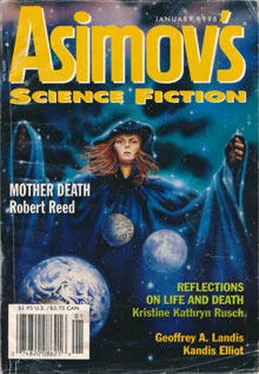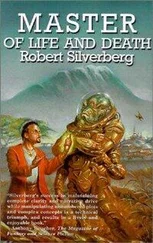Reflections on Life and Death
by Kristine Kathryn Rusch
“No,” Sarah’s mother said, her voice barely more than a whisper around the tubes. “You can’t. They kill people in there.”
Sarah held her mother’s good hand—the one without the IV. Small chips dotted her mother’s face and body, each scanning vital signs. It made her look as if she had chickenpox.
The doctor was watching Sarah. The doctor was a thin thirtyish woman with nut-brown eyes and light brown skin. Her hair, a delicate blonde, was shoulder length and covered with a nearly invisible clean-net so no strands fell free.
“Sarah?” the doctor said, and it made Sarah wonder how a woman ten years younger than herself managed to sound make one word so condescending.
“Sarah—” her mother said again. “You can’t.”
“You can’t go home,” Sarah said.
“But you could take me.”
Sarah closed her eyes. One more thing. It had taken all of her strength to get to the hospital each day before visiting hours closed. She had lost a day of work to be here this afternoon. Her secretarial job was rare, precious, and difficult. It also only paid a quarter of what she really needed. Besides, the children were doubled up in one room in her two-bedroom apartment. If her mother came to stay, someone would have to sleep on the couch.
Her mother’s hand clutched, the bones cutting off the circulation in Sarah’s fingers. Sarah opened her eyes. Her mother’s skin was chalk-white; her lips almost blue.
“Please,” she said.
“You didn’t take Gram,” Sarah said, and then bit her tongue.
“I don’t think you need me any longer,” the doctor said. “Page me, Sarah, when you reach a decision.”
“It’s not her decision to make,” her mother said.
“What do you want to do, Mrs. Chomley?” the doctor asked, addressing Sarah’s mother for the first time.
“I want to go home,” her mother said.
“That’s not possible,” the doctor said.
“Then I want to go with Sarah.”
The doctor looked at Sarah. Sarah looked away. How come the doctor, who usually ignored her mother, used a respectful title when she finally addressed her?
“Do you have other family?” the doctor asked.
“No,” Sarah said.
“Then it looks, my dear,” the doctor said, “as if it’s up to you.”
1986: Gram’s backyard. Icicles hanging off winter trees, sleet making the air a grayish mist. The streetlights burned white, and the cold was so deep that Sarah could see her breath.
She couldn’t move in her snowsuit and mittens. Gram sat beside her on the ice-crusted snow. They were going to make angels, but Gram had started crying. Sarah had never seen Gram cry.
“I don’t see nothing burning,” Sarah said, looking skyward. She’d seen the images all day. The happy astronauts waving as they carried their cases into the shuttle. The liftoff, and then the speck, exploding in the sky. She knew that when she threw something in the air, it came down. The higher she threw it, the longer it took. And Gram had said the shuttle was really high when it blew up.
“You won’t, hon,” Gram said. She had her arms wrapped around her knees. The tears made her eyelashes clump together. “The pieces have landed already. Far away. In Florida.”
“Floor-e-da,” Sarah repeated. “How come you are crying? Did you know them people?”
Gram shook her head. Then she tilted it back. “You can’t even see the moon tonight,” she said.
“There’s a man in the moon,” Sarah said.
“No, honey,” Gram said. “But once upon a time, there was a man on the moon.”
“Did you know him?” Sarah asked.
“No,” Gram said. “But it sure felt as if I did.”
The Martin Luther Extended Care Facility covered one city block near the old Dane County airport terminal. Sarah remembered when the entire area had been fields that were filled with the richest brown dirt she had ever seen. The MLECF was a new facility for middle- to low-income elderly. It covered the city block in small buildings, each stacked on top of each other, making the place a maze. The brochure said the design maximized available space. Sarah thought it maximized confusion.
It had been decades since she had been in a place like this. Not since she was a teenager, when nursing homes were still called nursing homes, and the places smelled of pee and antiseptic. MLECF smelled like roses. Nanotech hadn’t met the technological promises made by its proponents in the early nineties, but it had achieved a sort of olfactory victory: Perfume companies had discovered a way to make good odors eat bad ones. It was an expensive but satisfying service, one that made life in the late twenties much more bearable than life in the nineties.
The hospital had given her a twenty-four hour reprieve. It was not charity: the reprieve was required by law for anyone who requested it. It snapped all the social services into action. A social worker had been waiting for her by the front door of MLECF.
The tour was scripted: she saw the rehab rooms, the private suites, the entertainment center, and the kitchen. Mobile residents could cook their own meals on small counters in special suites. The place was as lovely as its brochure, but she knew this part of the facility was designed to put her at ease.
Except she wasn’t. She had seen no elderly.
“Where is everyone?” she asked the social worker when he brought her back to the front desk. He was a small man with graying hair and long, fashionable sideburns. His hands were the smallest trying about him—a child’s hands really—soft and square and delicate.
“Privacy laws,” he said. “We’re not allowed to let outsiders see the residents without their permission.”
“So when I visit my mother, will I be able to go to her room?” she asked.
“If you sign non-disclosure forms.”
“And if I were to sign them today?” she asked. “Could I see the rest of the facility?”
His smile was small, tolerant, distant. “We don’t have short-term forms,” he said.
“I’m not making a short-term decision,” she said. “This is my mother’s life.”
His gaze darted to her, then, and he sighed. “Come to my office, Ms. Chomley,” he said. He went around the front desk through a narrow corridor and into a small cubicle with no windows. His desk was built into the wall, the computer screen larger than normal and rather old. Its component parts hummed, something she associated with the computers of her childhood.
He sat in the chair behind the desk, and she took the only other one, a wire seat with an arched back. It was not made for comfort. She perched on the edge of it, waiting for him to go on.
“Your mother was diagnosed with old age, am I right?” he asked.
“They said you didn’t need to know,” she said, “not unless I decided.”
He shrugged. “It’s logical. People with hope of recovery don’t come here,” he said.
“But you have rehabilitation rooms,” she said. “What are they for then?”
He folded his small hands and rested them on the desktop. “They are for the handful of people who come here after surgeries, long illnesses, or comas. Not for people diagnosed as old.”
“Then why do old people come here?” she asked.
“Make their last years as comfortable as possible,” he said.
“Is that possible here?” she asked. “In one room?”
“One eighth of a room, Ms. Chomley,” he said. “We don’t have private rooms.”
“But the suites—”
“Are for rehabilitation patients.” He tugged on his sideburn, leaned forward, and whispered, “Do you love your mother, Ms. Chomley?”
“Of course,” she said automatically, even though she wasn’t sure it was true.
Читать дальше












